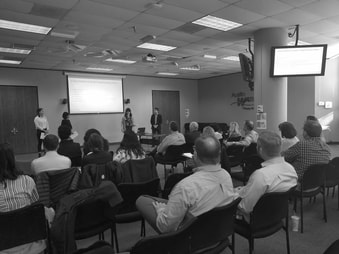TEACHING
Practicum graduate students presenting racial equity analysis to Austin Water
executives.
executives.
|
I teach courses on racism and the built environment and the social implications of sports stadiums. I also teach practicums and research design, core courses in the UT School of Architecture’s Community and Regional Planning graduate student curricula. My most recent practicum consisted of a partnership with Austin Water. Students provided analysis and recommendations on how to advance racial equity through the agency’s policies and programs, culminating in an award-winning report.
My goal as an instructor is to foster students’ knowledge and critical thinking about the intersection of the built environment and social justice. By drawing on social theory, current events, and students’ personal experiences, I encourage students to view themselves as current and future actors in the field. CURRENT EXPERIENCE Racial Equity in Austin Water Ways This planning studio was a partnership with Austin Water. We worked with several agency staff to conduct research on, and make recommendations about, how the utility could advance racial equity through its policies and procedures. Sports Stadiums and Society This course explores the social, political, and economic implications of sports stadiums and arenas in the US. It draws on urban planning and social science theory to examine how and why cities plan them, how they are sites of contested power and resistance, and why both these questions have racial meaning. Race and the City This practice-based course examines the causes and effects of inequity in the San Francisco Bay Area, with a focus on who benefits from economic development decisions. It exposes students to public and nonprofit sector individuals and institutions laying the groundwork for an equitable regional economy. Research Design This course is intended to assist graduate students in writing a professional report, thesis or dissertation proposal. PAST EXPERIENCE Environmental Policy & Regulation Examines emerging trends in environmental planning and policy and the basic regulatory framework for environmental planning encountered in the U.S. Planning Methods Gateway Part I Introduces Master of City Planning (MCP) students to a suite of data collection, data analysis, problem solving, and presentation methods that are essential for practicing planners. Focuses on supporting integrated problem solving, using a case-based approach to introduce methods in sequenced building-blocks. Planning Methods Gateway Part II Prepares MCP students for more advanced courses in statistics, GIS, observation, qualitative methods, survey methods, and public participation. Introduction to Planning Practice Using challenging real-world cases, this course covers the persistent dilemmas, the power and limits of planning action, the multiple roles in which planners find themselves in communities around the globe, and the political and other constraints that planners face as they try to be effective. |

